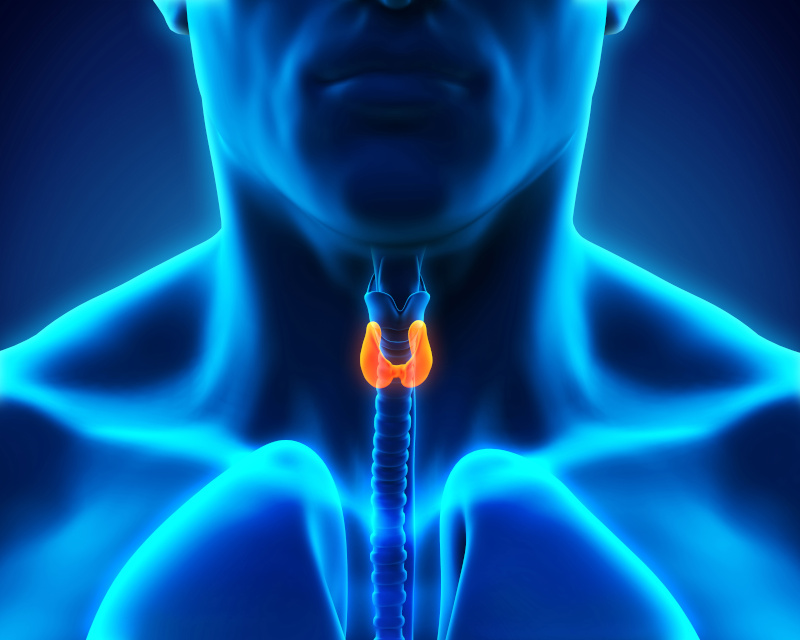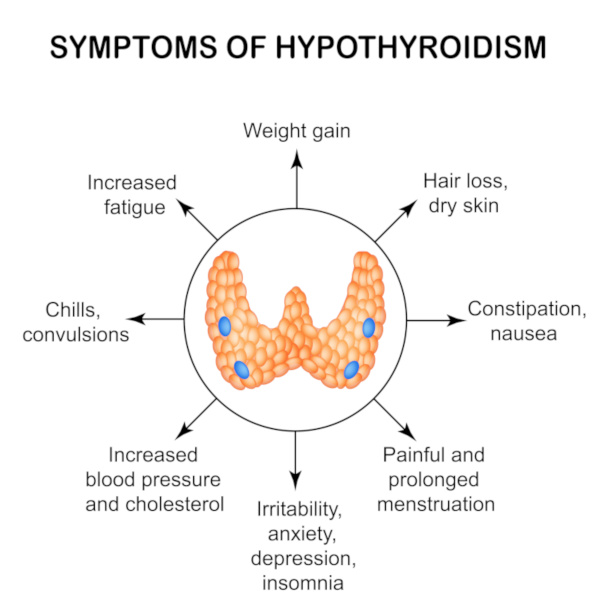What Does Your Thyroid Do?
The primary function of the thyroid is producing two thyroid hormones, triiodothyronin (T3) and thyroxine (T4), and a peptide called calcitonin. These hormones regulate pretty much everything your body does, for example:
Thyroid hormones increase the basal metabolic rate, influence appetite, stimulate the breakdown of fats, and beneficially decrease total and LDL (bad) cholesterol. The thyroid hormones also increase blood flow, heart rate, heat production, and energy production / consumption by influencing the activity of the mitochondria.
Further, the thyroid hormones play a role in muscle control, bone strength, sleep, mental acuity and healthy sexual function, including libido and normalizing the menstrual cycle.

Those are only a few functions of the thyroid, and why it is so important to have proper levels in your body. Too little thyroid hormone and you feel sluggish, you tend to gain weight, feel cold, and might be losing hair. Too much of the thyroid hormones and you might feel anxious or nervous, experience palpitations, feel hot, and experience muscle weakness.
Factors that affect Thyroid Hormone Production:
- Eating a nutritious diet with plenty of fruits and vegetables can increase thyroid activity.
- Eating too much protein (meat and poultry) or eating very little (like in low calorie diets, fasting or malnutrition) can consistently lower thyroid activity by slowing down the conversion of T4 to T3, as well as lowering the production of both thyroid hormones by the thyroid gland.
- Deficiency of zinc, copper, vitamin A, B2, B3, B6 and C can decrease production of T4.
- Selenium deficiency, stress, high carb diet, heavy metal toxicity, smoking, elevated cortisol, chronic illness and decreased kidney or liver function can affect conversion of T4 to T3.
- Iron (Ferritin levels) should be 100 ng/ml and 130 ng/ml for women who are still having menstrual cycles. Low levels can inhibit conversion of T4 to T3.

Common complaints associated with Hypothyroidism (Low thyroid hormone production):
- Fatigue. Feel like you are “hitting the wall”.
- Intolerance to cold, easily shivers, poor circulation.
- Easily distracted, irritability, insomnia, or depression.
- Brittle, ridged, striated, thickened or slow growing nails.
- Hair loss, thinning eyebrows, dry skin.
- Weight gain or difficulty losing weight.
- Muscle and joint pain.
- Menstrual irregularities.
- Numbness or tingling in the hands and feet.
How can you boost thyroid activity?
- Eat at least 1500 – 2500 calories per day of nutritious foods.
- Avoid skipping meals, processed foods, alcohol, vinegar, caffeinated drinks and milk products.
- Eat “Paleolithic” foods: plenty of fruits and vegetables, modest amounts of protein and fats.
- Eat organic foods and food rich in iron (red meat) and iodine (seafood, kelp).
- Avoid fiber rich cereals (whole grain bread, bran flakes, etc.).
- Get plenty of sleep.
- Avoid prolonged chronic stress.

Peak Medical Treatment Options
Sometimes, despite our best efforts, the thyroid simply won’t perform as well as it should. In these cases, you may benefit by getting your thyroid levels tested and possibly add medication.
The most commonly performed test, Thyroid Stimulating Hormone (TSH), is a good marker for checking thyroid function, but it should be combined, at a minimum, with tests for Free T3 and Free T4. The reason this is important is because only a very small amount of the thyroid hormones travel freely in the blood. Most are bound to proteins and unusable by the body. Only about 0.03% of T4 and 0.3% of T3 traveling freely have hormonal activity and provide us with the necessary benefits.
Effective treatment is not a one-size-fits-all solution, it requires a careful correlation of test results and symptoms, with an emphasis on optimization of TSH, Free T3 and Free T4 levels. It also includes close monitoring of effectiveness on symptoms and follow-up testing. Peak Medical will customize a plan for you and will continue to monitor and adjust to keep you at your optimal levels while allowing you to experience life at your PEAK.
If you are experiencing any of these symptoms or simply want to determine where your thyroid levels are, give us a call at 435-602-1034.